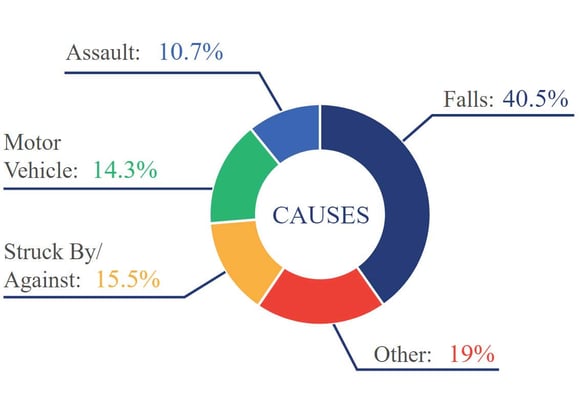D'Amore Personal Injury Law, LLC
Serious Injury Lawyers Proudly Serving
Baltimore, Annapolis, & Washington, D.C.
Traumatic Brain Injury Lawyer
Maryland Traumatic Brain Injury Lawyer
Brain injuries are the most catastrophic events a person can experience. They may be the result of traumatic force, stroke, a loss of oxygen, a medication error, or a misdiagnosed tumor.
Lawsuits involving brain or spinal cord injuries require a special skill. Our experienced brain injury lawyers understand the complexity of these cases. We are dedicated to getting you on a path to recovery, and securing the help you and your family need to move forward.
Clients Lives We've Helped Rebuild
He lost his ability to walk
"The Best Lawyer"
Brain Injury Definitions
TBI is an alteration in brain function, or other evidence of brain pathology, caused by an external force.
Acquired brain injuries are non traumatic. These include stroke, near drowning, hypoxic or anoxic brain injury, tumor, neurotoxins, electric shock or lightning strike.
Learn more about what to do after a Brain & Spinal Cord Injury in our FREE guide.
Types of Brain Injuries
- Concussion
- Shearing Injury
- Anoxic Brain Injury
- Hypoxic Brain Injury
- Closed Head Injury
- Penetrating Injury
- Open Head Injury
- Second Impact Syndrome “Recurrent Traumatic Brain Injury”
- Locked In Syndrome
- Shaken Baby Syndrome
- Contusion
- Learn More – Our Brain Injury Guide
Cause of Traumatic Brain Injuries

Outcomes After a Brain Injury
Brain injury can result in a range of outcomes:
- 52,000 die;
- 280,000 are hospitalized; and
- 2.2 million are treated and released from an emergency department.
Among children ages 0 to 14 years, TBI results in an estimated:
- 2,685 deaths;
- 37,000 hospitalizations; and
- 435,000 emergency department visits.
Source: Centers for Disease Control and Injury Prevention
Severity of Brain Injury
Emergency personnel typically determine the severity of a brain injury by using an assessment called the Glasgow Coma Scale (GCS). The terms Mild Brain Injury, Moderate Brain Injury, and Severe Brain Injury are used to describe the level of initial injury in relation to the neurological severity caused to the brain.
Severe Traumatic Brain Injury (GCS of below 8)
There may be no correlation between the initial Glasgow Coma Scale score and the initial level of brain injury and a person’s short or long term recovery, or functional abilities.
Keep in mind that there is nothing “Mild” about a brain injury—the term “Mild” Brain injury is used to describe a level of neurological injury. Any injury to the brain is a real and serious medical condition.
F.A.Q.
Brain injuries are caused by concussions and other traumatic head forces that cause damage to the brain (e.g., car accident, gunshot wound to the head, assaults, falls). Brain injuries can also be caused by subconcussive head impacts or hits to the head that don’t cause full-blown concussions.
Furthermore, brain injuries can be caused by other health issues like strokes, bleeding in the brain, lack of oxygen to the brain, brain infections, fluid buildup in the brain, toxic exposure and poisoning, and brain tumors.
Furthermore, brain injuries can be caused by other health issues like strokes, bleeding in the brain, lack of oxygen to the brain, brain infections, fluid buildup in the brain, toxic exposure and poisoning, and brain tumors.
- All concussions are TBI’s but not all TBI’s are concussions.
- TBI’s can be moderate or severe. A concussion is a mild or moderate TBI.
- TBI’s are divided into two categories: open and closed. Open head injuries are when the skull is broken or removed, allowing an outside force to act directly on the brain. Closed head injuries happen through an intact skull where the external force never comes into direct contact with brain matter.
- Concussion is the most well known type of closed brain injury. Concussions do not result in immediate danger of death but can have nasty long lasting effects. Concussions are usually difficult to diagnose.
- Severe TBI’s can be life endangering and can lead to a coma. Severe TBI’s can also result in long-term disabilities and permanent brain damages.
WHO RECEIVES MONEY AFTER A SUCCESSFUL BRAIN INJURY LAWSUIT?
This can be difficult for many parents and family members to accept. We often hear things like “why would anyone think I would steal from my baby?” Or, “I have other children and family members who have been impacted by the added time and money it has cost to care for our injured loved one. Why can’t we use the money to help our whole family?”
These are legitimate and totally understandable questions. Dealing with these issues is never easy. That is why we continue to work with our clients even after the case is successfully resolved. We work with trust managers, trust lawyers, and asset managers who are experts in this area of law, and who understand that our clients need to be cared for as a family unit. While each case is different, our goals are always the same:
- Ensure that the injured victim will be able to afford the care and services he/she will need in the future;
- Ensure the injured victim will be safe and secure even after his/her family can no longer care for him/her;
- Ensure that the family is satisfied with the plan that has been put into place.
DO I HAVE A CASE?
The answer to this question is rarely easy. The first step is contacting us to discuss the facts and circumstances of your injury. We never charge a fee for this discussion. In fact, we don’t charge our clients any fees unless we are able to secure a recovery for them.
HOW MUCH WILL IT COST TO FILE A BRAIN INJURY CASE?
Nothing.
FREE Case Consultation
Fill out the form below and we will contact you.
Or, give us a call at
